Dr. Sueo Machi,
FNCA Coordinator of Japan |
| |
The Fourth FNCA Coordinators Meeting (CM),
March 5-7, 2003, Naha-Shi, Okinawa,
Japan |
| |
| 1) |
The progress and future directions of FNCA projects in the eight fields
were reviewed, and their mid-term work plans were approved. The Meeting
agreed to the proposed venues for Workshops / Project Leaders Meetings
in FY 2003 under the FNCA framework. |
|
| |
| 2) |
In follow-up actions to the Third FNCA Meeting, three projects were proposed
on "Sustainable Development and Nuclear Energy in Asia", "Marine
Environmental Pollution Research and Monitoring using Nuclear and Nuclear-related
Analytical Techniques and FNCA Database", and "Maintenance Network
of Nuclear Medical Instrumentation". |
|
|
| |
| a. |
The Meeting approved the implementation of "Sustainable Development
and Nuclear Energy in Asia" project subject to availability of funds. |
| b. |
For the proposal on "Marine Environmental Pollution Research and Monitoring
using Nuclear and Nuclear-related Analytical Techniques and FNCA Database",
it was endorsed to be implemented within the on-going project on "Neutron
Activation Analysis". |
| c. |
For "Maintenance Network of Nuclear Medical Instrumentation",
a survey on the condition of gamma cameras in terms of operation and maintenance
was recommended in order to formulate a project work plan, before FNCA
approves this proposal. |
|
|
| |
| 3) |
The Meeting dealt with "Strategy for Human Resources Development"to
note the necessity of cooperation with other parallel initiatives being
made on this subject, in other international organizations. |
|
| |
| 4) |
Importance of strengthening linkage with end-users of technologies was
recognized to achieve socio-economic development. FNCA Coordinators were
encouraged to support project leaders in their efforts to cooperate with
end-users. In this respect, it was suggested that Open Lectures be conducted
in conjunction with the Workshops. |
|
| |
| 5) |
The Meeting recognized importance of strengthening the partnership in FNCA
activities and increased government support, such as funding for projects
carried out in each country, and the recognition of FNCA activities as
part of the national programs was recommended. |
|
| |
| 6) |
It was recommended that at the national level, linkages between FNCA Coordinators
and Project Leaders be enhanced. |
|
| |
| Highlights of FNCA Project Activities |
| 1) |
Tc-99m Generator Production
New projects on "Tc-99m Generator Production" using Mo-99 produced
by (n,_) reaction and Poly-Zirconium Compound (PZC) adsorbent have remarkable
progress in design of production system in Japan and Indonesia. The demonstration
of manual production was made in BATAN at the Workshop in 2003. A larger
scale automatic plant for loading Mo-99 adsorbed PZC will be installed
in BATAN, Indonesia in December 2003. The demonstration of the plant operation
will be performed during the next Workshop in January 2004. BATAN-Kaken
Joint Patent on the PZC based Tc-99m generator and Mo-99 loading machine
has been already applied in Japan (Oct. 31, 2002) and Indonesia (Feb. 24,
2003).
Future plans: |
|
| |
| |
| 1.Quality assurance test of the Mo-PZC loaded column in Indonesia. |
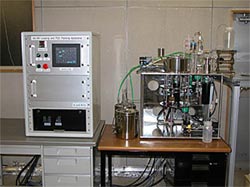 |
Automatic loading machine for
Mo-99 adsorbed PZC |
|
|
| |
| 2) |
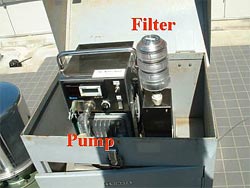 |
| Sample collection of airborne particulates in Japan |
Neutron Activation Analysis (NAA) for Monitoring Airborne Particulates
The particulate samples were collected in each country using common filters
provided by Japan, in urban and rural areas to be analyzed by the NAA.
The monitoring are being continued and the compiled report will be published
in the 1st quarter of 2004. "Ko- method", which improves efficiency
of NAA to be affordable in measurement of large number of environmental
samples is being developed by the collaboration of the Chinese, Vietnamese
and Japanese experts. |
|
| |
|
| Future plans: |
| a. |
Pollution monitoring data of airborne particulates in urban and rural areas
in FNCA countries will be compiled in 2004 |
| b. |
Ko-method of NAA should be established in collaboration with IAEA in 2004 |
| c. |
Results of NAA measurements of airborne particulates should be used for
the planning of environmental control of FNCA countries. In this regard
the coordination with ministry responsible for environmental control should
be strengthening. |
| d. |
The proposal of Viet Nam to monitor pollution of sea water in coast will
be implemented by the measurement of sediment and/or biota in the sea coast
using NAA after 2004. |
|
| |
| 3) |
Neutron Scattering
The project on "Neutron Scattering" is focusing on application
of the small angle neutron scattering (SANS) for studying structure of
natural polymers produced in the FNCA countries. In 2003 one scientist
from Thailand and one from the Philippines have studied the structure of
the modified natural rubber and carrageenan, respectively in Japan in collaboration
with the University of Tokyo, Kyoto University and JAERI. Structure of
industrial polymers was also studied. |
|
| |
|
| Future plans: |
| a. |
Expert meeting on the project will be held in Indonesia in 2004 to discuss
the specific applications of SANS which meet industrial research needs
and common interests of FNCA countries. |
| b. |
The study on the structure of natural and industrial polymers will be continued
in 2004. |
|
| |
| 4) |
Mutation Breeding
The project on "Mutation Breeding" has started a new specific
activity in 2002 with participation of China, Indonesia, the Philippines
and Viet Nam to develop new varieties of the drought-tolerant sorghum and
soybean, and activity of insect-resistant orchid in 2003 with participation
of Indonesia, Malaysia and Thailand. Experimental materials of soybean,
sorghum and orchid have been exchanged between the participating countries.
Better mutant variety of sorghum has been developed in Indonesia. Malaysia
and Indonesia are about to join "soybean" activity in 2003.
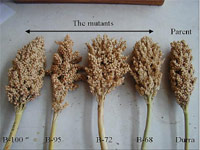 |
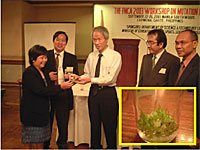 |
| Mutant sorghum (Indonesia) |
Exchange of experimental materials of orchid
at the Workshop in 2003 |
|
|
| |
|
| Future plans: |
| a. |
Selection of better mutant varieties of sorghum, soybean and orchid will
be continued and intermediate results will be reviewed in 2004. |
| b. |
Mutation breeding for disease resistant banana will be started by Indonesia,
Malaysia, the Philippines and Viet Nam in 2004. |
| c. |
In order to increase kinds of mutant, the utilization of the ion accelerator
of JAERI may be facilitated by the FNCA Coordinator of Japan responding
the specific request of FNCA countries. |
|
| |
| 5) |
Biofertilizer
The 1st Workshop of the project on "Biofertilizer" has formulated
the work plan in 2002 and 2003 including the field demonstration in participating
countries to show impacts of the biofertilizer. The 2nd Workshop in Viet
Nam was jointly organized with JSPS Research Project of Biofertilizer with
participation of the IAEA and ICRISAT experts. Field demonstration of biofertilizer
(Rhizobia) for peanuts in Viet Nam was successful. The strategy for extension
of biofertilizer was formulated in each country.
|
|
| |
|
| Future plans: |
| a. |
Strategic demonstration of biofertilizer application in less-fertile soil
in 2004 and 2005 |
| b. |
Pilot production of biofertilizer using radiation sterilization of carriers
in 2004 and 2005 |
| c. |
Support of IAEA for measurement of N2 fixing using N-15 |
|
| |
| 6) |
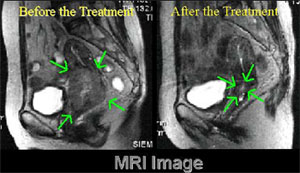 |
| Radiation therapy of uterine cervix cancer using FNCA protocol |
Radiation Oncology
The project on the radiation therapy of uterine cervix cancer has achieved
remarkable progress. The clinical study on radiation therapy using the
standard protocol "CERVIX-I" in FNCA participating countries.
This treatment regimen produced a favorable outcome, with the 5 year overall
survival and local tumor control rates for stage IIIB patients being 52.5%
and 81.5% respectively. These results were comparable with or somewhat
superior to those of the American and European series. The guidebook on
the treatment protocol "CERVIX-I" has been published in 2002
for radiation oncologist. In conjunction with the FNCA Workshop, the Open
Lecture on "Radiation Therapy" was presented for 150 audiences
in 2003 in Tokyo. A clinical study on chemo-radiotherapy for advanced uterine
cervix cancer has been conducted since 2003. |
|
| |
|
| Future plans: |
| a. |
The clinical test on chemo-radiotherapy for advanced the uterine cervix
cancer will be fully implemented in 2004. |
| b. |
The clinical study on chemo-radiotherapy for nasopharyngeal cancer also
will be preliminarily studied in 2004. |
| c. |
Activities on QA/QC of radiation therapy in 2004 |
|
| |
| 7) |
Public Information (PI) for Nuclear Energy
In this area, a joint cross-national survey on "radiation" was
carried out in seven FNCA countries. In each country, a total of 1,100
male and female high-school students served as respondents. The results
of the survey are expected to serve for improving the strategy for effective
communications.
Under the FNCA Regional Speakers Bureau Activity, three speakers were sent
to the ICN'02 in Malaysia in 2002 and one speaker to the NuTech 03 in Thailand.
In conjunction with Project Leaders Meeting in Viet Nam in 2003, two Open
Seminars were held on "Public Information Strategies for Developing
Nuclear Power" in Hanoi and "Application on Radiation Technology
in Industry". More than 200 local specialists attended the both seminars.
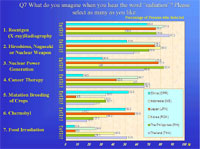 |
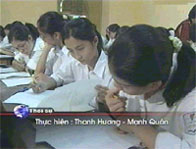 |
| An example of the result of the joint survey on |
Students answering the questionnaire in Viet Nam |
|
|
| |
|
| Future plans: |
| a. |
In order to enhance communications with mass media, national seminars will
be organized in each country in 2004, where the FNCA will facilitate (provide)
necessary means (experts). |
| b. |
The possibility for the FNCA to train nuclear communicators will be explored
also in 2004. |
| c. |
It is proposed that FNCA's Web-site (http://www.fnca.jp/english/) should
be improved by more active participation of all FNCA countries by increasing
the two-way traffic of information in 2004. |
| d. |
It is recommended that the next PL meeting will be held in Thailand in
2004 in conjunction with an Open Seminar on "Research Reactor Application
for Science and Industry". |
|
| |
| 8) |
Radioactive Waste Management (RWM)
The Task Group for the sub-project on "Spent Radiation Source Management"(SRSM)
had useful visits to relevant facilities to have fruitful discussion in
Indonesia and Korea in 2002. Activity report of this SRSM Task Group was
published in March 2003. The consolidated report on RWM has been completed
in February 2003, which contains useful updated information. It was agreed
that the sub-project on "TENORM" replaces "SRSM". Expert
group visited Malaysia and Viet Nam to assess the safety of TENORM (Technologically
Enhanced Naturally Occurring Radioactive Materials) management in 2003. |
|
| |
|
| Future plans: |
| a. |
Expert group visits to Thailand and China to assess safety of TENORM management
in 2004. |
| b. |
Review of National Radiation Safety Standard status in accordance with
IAEA Basic Standard |
| c. |
Characterization and classification of wastes for each FNCA country. |
|
| |
| 9) |
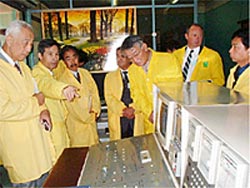 |
| Peer review team in Da Lat, Viet Nam |
Nuclear Safety Culture (NSC)
The self-assessment of research reactors has been conducted in each FNCA
country in order to identify the areas for further improvement in fostering
safety culture and management. The first peer review of safety culture
for research reactor was carried out successfully in Viet Nam on the research
reactor of Dalat Nuclear Research Institute in January 2003. Some useful
comments and information were presented for Vietnam Atomic Energy Commission
(VAEC) to take into account for the improvement of safety culture. |
|
| |
|
| Future plans: |
| a. |
Peer review of HANARO (High-flux Advanced Neutron Application Reactor of
KAERI) safety culture in 2004 |
| b. |
Self-assessment of safety culture in each FNCA country in accordance with
IAEA Codes of Conduct |
| c. |
Review of the project outcome in the past years |
|
| |
| 10) |
Human Resources Development (HRD)
The development of the common training materials in radiation protection
area and introduction of e-learning system, are being progressed. The survey
of basic data on HRD such as, currently available human resources and the
demand to meet national program are being carried out in FNCA countries,
which should be used to formulate a national strategy of HRD and the strategy
of FNCA's HRD project. The matter of regional networking for research,
high education and training was raised at the Workshop and the 3rd FNCA
Meeting |
|
| |
|
| Future plans: |
| a. |
National HRD strategy should be drafted based on results of the survey
of HRD database to be discussed at the HRD Workshop in 2004 |
| b. |
Preparation of a model method for HRD strategy formulation in 2004 |
| c. |
The FNCA approach to ANENT should be examined |
|
| |
| 11) |
Application of Accelerators
According to the work plan at the 2nd Workshop, demonstration for liquid
system was conducted by the JAERI Japan in December 2002.
The 3rd Workshop on Application of Electron Accelerators was held at Kuala
Lumpur, Malaysia, where the status of utilization of electron accelerator
for thin films in the participating countries was discussed and the future
program was formulated. The demonstration for thin film irradiation was
achieved in MINT Malaysia 2003. The Cost analysis of the low energy electron
process is in progress.
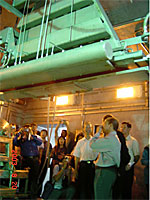 |
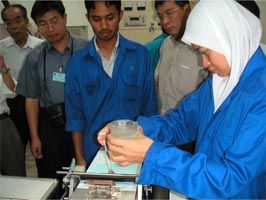 |
| Electron accelerator in MINT, Malaysia |
Demonstration to prepare thin film to be irradiated |
|
|
| |
|
| Future plans: |
| a. |
Demonstration of flue gas treatment in China in 2004 |
| b. |
Evaluation of radiation processing of liquid, solid, and gas samples by
low energy electron accelerator |
|
